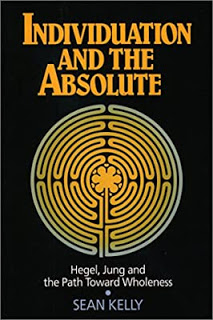Individualism vs Colectivism, is there a correct balance? Carl Jung was said to have had scintillating intelligence, but he found the works of Hegel impenetrable, despite this, professor Sean Kelly found a great deal of similarly between their works when it came to self-consciousness and individualism, where both believed mankind was further moving towards increased self consciousness. The word individual comes from the word indivisible, meaning we cannot be split any further. The collective has been divided into individual identities. Primitive man projected his soul onto the universe, so the trees, the sky, the Sun, the weather, the stars, ect, all had spirits. Man's primitive consciousness was hardly separated from his surroundings, said Hegel and Jung. Both Hegel and Jung saw the West
Topics:
Mike Norman considers the following as important:
This could be interesting, too:
Robert Vienneau writes Austrian Capital Theory And Triple-Switching In The Corn-Tractor Model
Mike Norman writes The Accursed Tariffs — NeilW
Mike Norman writes IRS has agreed to share migrants’ tax information with ICE
Mike Norman writes Trump’s “Liberation Day”: Another PR Gag, or Global Reorientation Turning Point? — Simplicius
Individualism vs Colectivism, is there a correct balance?
Carl Jung was said to have had scintillating intelligence, but he found the works of Hegel impenetrable, despite this, professor Sean Kelly found a great deal of similarly between their works when it came to self-consciousness and individualism, where both believed mankind was further moving towards increased self consciousness. The word individual comes from the word indivisible, meaning we cannot be split any further. The collective has been divided into individual identities.
Primitive man projected his soul onto the universe, so the trees, the sky, the Sun, the weather, the stars, ect, all had spirits. Man's primitive consciousness was hardly separated from his surroundings, said Hegel and Jung.
Both Hegel and Jung saw the West as the pinnacle of civilisation, along with it's high level of individual self-consciousness. In Rome, they said, only the emperor was an individual and everyone else would just see themselves as part of the group, and it was the same in China and all other third-world countries, they added. They were more primitive collective societies.
Christianity greatly increased the sense of individualism and self-consciousness, both Jung and Hegel believed. God knew every hair on your body, and there was a banquet in heaven when the lost sheep was found, so every individual person was very important to God.
The Bible eventually became translated into English, so now every person could read the Bible, which led on to the Protestant reformation. People now had a much closer, more personal, individual relationship with God.
Protestant Christianity produced Calvinism, which said that hard work and success signified that God had chosen you to go to heaven. And so the Calvinists - being puritans - did not spend their money on worldly possessions, but instead ploughed all their profits back into their businesses to grow them, and in this way they felt that they had been chosen. Modern capitalism was then born.
At that period in time most people were God-fearing Christians, and so for the first time in history it became possible for people to leave their money in an institution, like putting an investment into a company, and then be able to go back the next day to find their money was still there. This meant that banks and the stock market now became possible, which meant that western civilisation could make spectacular advancements, eventually leading to the industrial Revolution, much of which was funded by shares. This new Western sense of individualism eventually led to democracy where every person got a vote.
But were Carl Jung and Wilhelm Friedrich Hegel both unwittingly intoxicated by Western hubris? They believed that Western civilisations were the most advanced, and that our self-consciousness (as individualism) was more heightened than those of people in the East, but could this belief in the absolute importance of the individual over the collective now be holding us back?
Neoliberalism, the Ayn Rand mentality, the extreme right, the populist alt-left, libertarianism, etc, all seem to be examples of corrosive individualism.
Many people in the West refuse to wear masks, or practice social distancing, despite there being a serious pandemic going on which could kill millions. They say the economy needs to be saved first, which would save more lives in the long run, but they also object to wearing masks which could save the economy as well as lives, and so their concern does not seem to be all that genuine. It appears that they want to carry on the way they have always done, with little regard for anyone else, because they believe that coronavirus is harmless to them.
The East was once considered less advanced than the West, but I'm beginning to believe that academics like Carl Jung and Georg Wilhelm Friedrich Hegel may have got it wrong. The East in many ways seems to be more cultured and civilised compared to some Western countries, and despite our emphasis on the value of the individual, the East seems to place far more value on an individual's life.
The libertarians might find this disturbing as it looks like social conditioning to produce a conformist, compliant society. But to me, it's culture, refinement, and civilisation.

